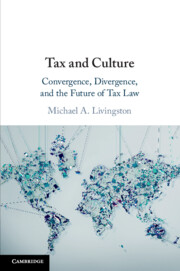Book contents
- Tax and Culture
- Tax and Culture
- Copyright page
- Contents
- Acknowledgments
- 1 Introduction: Comparative Law and Its Relevance to the Tax Field
- 2 Tax Anthropology: Attitudes, Behaviors, and the Role of Historical Contingencies
- 3 Tax Sociology: The Significance of Tax Institutions
- 4 Convergence, Divergence, and the Persistence of National Differences
- 5 Case Studies I: The Tax Cultures of Selected Western and Non-Western Countries
- 6 Case Studies II: Progressivity, Tax Avoidance, and Environmental Taxes
- 7 Conclusion: The Limits of Globalization and the Continuing Importance of Culture
- Index
4 - Convergence, Divergence, and the Persistence of National Differences
Published online by Cambridge University Press: 13 March 2020
- Tax and Culture
- Tax and Culture
- Copyright page
- Contents
- Acknowledgments
- 1 Introduction: Comparative Law and Its Relevance to the Tax Field
- 2 Tax Anthropology: Attitudes, Behaviors, and the Role of Historical Contingencies
- 3 Tax Sociology: The Significance of Tax Institutions
- 4 Convergence, Divergence, and the Persistence of National Differences
- 5 Case Studies I: The Tax Cultures of Selected Western and Non-Western Countries
- 6 Case Studies II: Progressivity, Tax Avoidance, and Environmental Taxes
- 7 Conclusion: The Limits of Globalization and the Continuing Importance of Culture
- Index
Summary
The globalization phenomenon and its attendant limitations are by now so well-known as to require no introduction. In the happy version of the story, nations converge around a consensus of political democracy, open markets, and the “end of history” as we once knew it.1 In the less happy version the phenomenon is a thinly veiled rationale for racism, oppression, and the resurgence of an American-dominated empire.2 The truth is somewhere in between: one way or another, the concept is here to stay.
- Type
- Chapter
- Information
- Tax and CultureConvergence, Divergence, and the Future of Tax Law, pp. 50 - 71Publisher: Cambridge University PressPrint publication year: 2020

